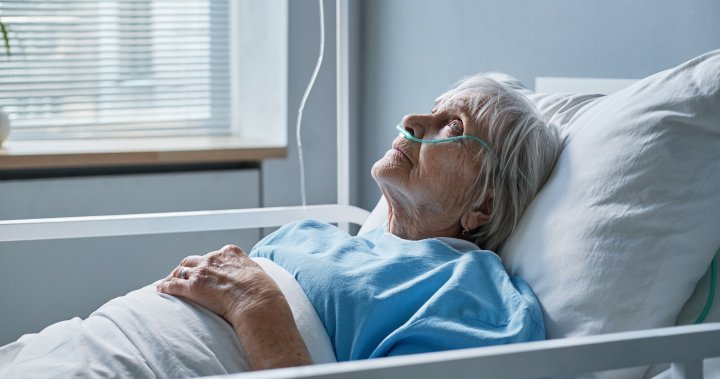Older Canadian women face challenges accessing medical specialists and non-emergency tests compared to older men, according to a recent Statistics Canada report.
The report released Wednesday, called ‘Access to specialized health-care services among older Canadians’ looked at the challenges faced by Canadians aged 65 and older in accessing health-care services, considering factors such as gender and immigration.
Women appear to encounter the greatest difficulty in accessing care.
“It’s a problem because we know that there’s a care gap here,” Dr. Samir Sinha, director of geriatrics at Sinai Health and the University Health Network in Toronto, told Global News.
“Women in particular, they’re having trouble more so than men in terms of accessing this care. This could mean delayed diagnosis. It could mean delayed treatment and also more disability. And that’s perhaps why we see higher incidences of things like dementia in older women.”
As Canada’s aging population continues to grow, the demand for health-care services, particularly specialized care, is expected to surge in the coming years, according to the report. In 2020, older adults accounted for a substantial 44 per cent of the country’s total health expenditures.
The report highlights that in 2021, 18.5 per cent of the Canadian population was aged 65 years or older, with projections indicating a rise to between 21.4 per cent and 23.4 per cent by 2030. This demographic shift is primarily attributed to factors such as the aging baby boomer population, increasing life expectancy, and declining fertility rates.
Using data from the 201-20 Canadian Health Survey on Seniors, the study looked at the prevalence and difficulty of accessing specialized health-care services, including medical specialists, non-emergency medical tests and non-emergency surgeries.
The study population represented 3.2 million women and 2.7 million men aged 65 years or older (54 per cent were women and 46 per cent were men) living in private households in the 10
provinces. The majority were aged 65 to 74 years, married or living in common-law, and born in Canada. Most had a regular medical doctor and were living in urban areas.
The latest health and medical news
emailed to you every Sunday.
The latest health and medical news
emailed to you every Sunday.
During this period, around 2.6 million older Canadians reported visiting medical specialists and 1.4 million reported getting non-emergency surgery. However, an estimated half-million reported having difficulty getting these services. This included difficulty getting a referral, securing an appointment, wait time being too long, and services not being available either at the time required or in the area.
Women were “significantly less likely” than men to experience difficulty visiting medical specialists and getting non-emergency tests, the study found. There were no gender differences in getting non-emergency surgeries.
“There are real differences in our health-care system on the basis of gender and that becomes more true as we age,” explained Laura Tamblyn-Watts, CEO of CanAge, a national seniors’ advocacy organization. “Often older women do not necessarily have their own pain validated.”
The study found that men aged 75 to 84 years were more likely to visit medical specialists and get non-emergency tests than those aged 65 to 74 years. Among women, those aged 85 years or older were less likely to visit medical specialists and get non-emergency tests than those aged 65 to 74 years.
“Older adults are often not believed or not able to get specialist appointments, and women are also not believed and not able to get imaging or specialist appointments,” Tamblyn-Watts said. “Brought together, you’ve got a bit of a perfect storm of ageism and gender discrimination.”
The study also found that immigrants were less likely to have used specialized health-care services than their Canadian counterparts. For example, women who immigrated from non-European countries had lower odds of visiting medical specialists.
Tamblyn-Watts believes this demographic may have difficulty accessing care due to several barriers, such as culture, language and finances.
“They may feel that they are not able to pay for health-care services, or they may not yet qualify for full health-care services. They may be concerned that their own health experiences in the past will make them feel exposed or more vulnerable in the health-care system,” she explained.
The report emphasized the challenges older Canadians face in accessing specialist care, Sinha said. It also highlights the gender gap, illustrating the greater difficulty older women encounter in accessing specialist care and essential testing.
“We know that in terms of accessing specialist care, sometimes funds are needed, to be able to pay for parking or take a bus,” he said.
“We know for older women in particular, they’re more likely to be caregivers to other people, so their time might be more limited in terms of being able to get the time to go and see a specialist or undertake a test. And older women are less likely to be as financially secure as older men. And so therefore, if they can’t afford to pay for parking at the hospital, if they can’t afford to take time off work or from providing care.”
He also noted that older women and men tend to present symptoms differently, resulting in women being more susceptible to misdiagnoses or missed opportunities for diagnosis and treatment.
“For example, we know that shortness of breath might be a very common symptom in a woman who has heart disease compared to an older man who might talk about having chest pain. So, it’s about understanding how to recognize what might be more concerning signs and symptoms in older women versus older men,” he said.
Tamblyn-Watts emphasized that because women typically outlive men, early detection of diseases, such as cancer, is crucial. Without proper diagnosis, many women may endure greater degrees of illness, increased risk of fatality and unnecessary pain.
Sinha believes that more research is needed to understand how older women may be overlooked in the health-care system.
“Is it because we’re not recognizing when older women need to be referred to specialists? If we understand what those barriers are, we will be better at addressing them as well,” he said.
— With files from Global News’ Katherine Ward




